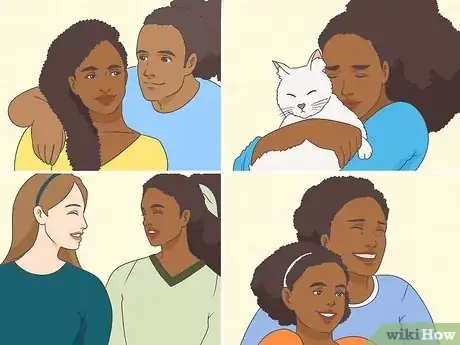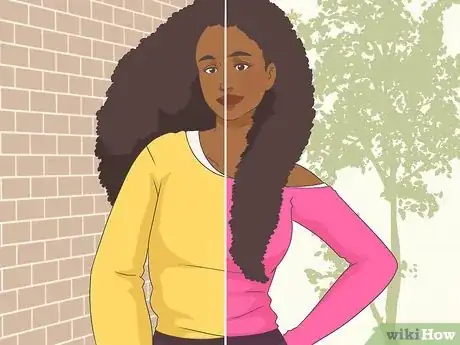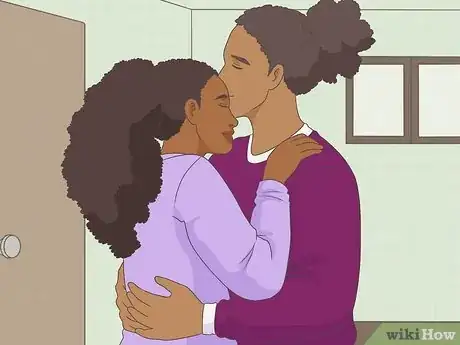This article was co-authored by Cherlyn Chong and by wikiHow staff writer, Amber Crain. Cherlyn Chong is a breakup recovery and dating coach. With 6 years of experience, she specializes in working with high-achieving professional women who want to get over their exes and find love again. She has experience as an official coach for The League dating app, and has been featured on AskMen, Business Insider, Reuters and HuffPost.
There are 10 references cited in this article, which can be found at the bottom of the page.
This article has been viewed 27,636 times.
Finding love is one of life's most beautiful experiences, but the word "love" is so abstract. In this article, we’ll briefly explain what love means in different types of relationships before focusing on romantic relationships, specifically. We’ll also talk about the difference between being in love and loving someone, since they're different experiences. Read on for our comprehensive guide to the meaning of love in relationships.
Steps
Emotional bonding
-
There are different kinds of love—all of them are valid. Most people think of romantic relationships when they think of love, but you can experience real love for your friends, family members, and even your pets. Creating a variety of emotional bonds is a vital part of being human.[1] X Research source
- In general, love means caring for someone deeply because you choose to—there's no obligation for you to feel that way. You just do.
- At the end of the day, love is a very personal experience. It doesn't always look or feel the same for everyone (and that's okay).[2] X Research source
Mutual respect
-
You value each other’s opinions and beliefs above all others. If you need advice, the first person you go to is your partner (and vice versa) because you respect them and truly care what they think. You know they’ll always be honest with you and respect your personal boundaries without questioning them.[3] X Research source
- Being together 24/7 isn't love—it's attachment. In a loving relationship, you both know that spending time apart is healthy and you're okay with that.
- Consent is always a part of a loving relationship. If you love someone, you would never pressure them to do something they don't want to do.[4] X Research source
Connection
-
You stay in tune with each other's feelings at all times. If your partner is happy, you feel their happiness. If they’re down or depressed, you feel their pain and want to help. A couple’s physical connection can wax and wane when over time, but if you really love someone, the emotional connection is always there.[5] X Research source
- Real connection means that you and your partner's needs are equally important and you can easily communicate them.[6] X Research source
Feeling comfortable
-
You show your true colors without worrying about being judged. You know without a shadow of a doubt that your partner loves your authentic self. You feel safe revealing every facet of who you are and you share your thoughts without reservations. You never hide or obscure parts of your self.[7] X Research source
- Feeling secure enough to let your guard down around your partner creates a sense of belonging. You feel at home and safe with them.
Supporting each other
-
You cheer each other on and celebrate each other’s wins. Your goals and dreams are important to your partner. Likewise, seeing your partner succeed brings you real joy and you’ll go out of your way to help them achieve their goals. Their success is your success, and you support them all the way.[8] X Research source
- Love is always mutually supportive—it's never one-sided. The same amount of support is there for both of you, even when the chips are down.
Trusting each other
-
You have faith that your partner has your best interests at heart. True love means never worrying that your partner will be unfaithful. You just know, deep down, that they would never hurt you that way. Your relationship is a top priority for both of you.[9] X Research source
- Building trust takes time; it doesn’t happen overnight. If you're in a new relationship, trust will grow as you get to know each other more.
Caring unconditionally
-
Your feelings won’t change in spite of your partner’s flaws or mistakes. Loving someone unconditionally doesn’t mean you’ll put up with poor treatment, infidelity, or abuse. You aren’t blinded by your feelings—on the contrary, you’re looking at the relationship through a realistic lens. You accept their shortcomings (which everyone has) and never punish them for their mistakes.[10] X Research source
- Unconditional love also means that you don’t expect anything in return for your love—it’s freely given. Your relationship isn’t transactional.
Willingness to compromise
-
Compromise turns conflicts turn into problem-solving sessions. Occasional conflict is healthy and normal in a loving relationship. That said, your partner will never feel like your enemy, even during a bad fight. Instead, both of you focus on solving the problem, giving and taking as needed, so you can get back to being happy together.[11] X Trustworthy Source New York State Government Official website for the State of New York Go to source
- Once a conflict is over, it's over. You can let it go. You don't hold onto resentment if you love someone.
Growing and thriving together
-
Real love allows you to flourish independently and as a couple. Love pushes us to be our best selves, and a loving partner will encourage you to do this. You’re emotionally connected to each other but not attached at the hip, so you both have time to work on your own projects. You bring out the best in each other.[12] X Research source
Long-lasting commitment
-
Real love takes time to develop and nourish. Loving someone is a conscious decision that you make every day. It means you choose to stay together through thick and thin, navigating life’s ups and downs together. Your bond is unshakable and long-lasting, and it isn't created overnight.[13] X Trustworthy Source PubMed Central Journal archive from the U.S. National Institutes of Health Go to source
- Being "in love" and "loving someone" are different experiences. Falling in love is something that happens to you. It's a beautiful experience, but it’s also an unconscious act. That said, it opens the door to real love and sets the stage for a long-lasting commitment.
You Might Also Like



 12+ Cute and Unique Ways to Ask a Girl to Be Your Girlfriend
12+ Cute and Unique Ways to Ask a Girl to Be Your Girlfriend






 20+ Ways to Tell If Someone Sincerely Loves You (Whether or Not They Say It)
20+ Ways to Tell If Someone Sincerely Loves You (Whether or Not They Say It)
 How to Make Your Girlfriend Fall For You Again (And Keep Her for Good!)
How to Make Your Girlfriend Fall For You Again (And Keep Her for Good!)

 How to Increase Your Sex Appeal (12 Ways to Make Everyone Want You)
How to Increase Your Sex Appeal (12 Ways to Make Everyone Want You)
References
- ↑ https://iep.utm.edu/love/
- ↑ https://plato.stanford.edu/entries/love/
- ↑ https://www.joinonelove.org/signs-healthy-relationship/
- ↑ https://www.loveisrespect.org/resources/what-consent-does-and-doesnt-look-like/
- ↑ https://www.psychologytoday.com/us/blog/rediscovering-love/201601/is-true-love
- ↑ https://ideas.ted.com/the-3-core-skills-that-every-person-needs-for-healthy-romantic-relationships/
- ↑ https://www.joinonelove.org/signs-healthy-relationship/
- ↑ https://www.psychologytoday.com/us/blog/pathological-relationships/201202/healthy-love-what-in-the-world-is
- ↑ https://www.joinonelove.org/signs-healthy-relationship/
- ↑ https://www.psychologytoday.com/us/blog/in-the-name-love/201005/should-love-be-unconditional
- ↑ https://www.ny.gov/teen-dating-violence-awareness-and-prevention/what-does-healthy-relationship-look
- ↑ https://www.psychologytoday.com/us/blog/rediscovering-love/201601/is-true-love
- ↑ https://www.ncbi.nlm.nih.gov/pmc/articles/PMC3039217/
About This Article























































